|
|
|
Sort Order |
|
|
|
Items / Page
|
|
|
|
|
|
|
| Srl | Item |
| 1 |
ID:
179559


|
|
|
|
|
| Summary/Abstract |
Studies of China's Belt and Road Initiative (BRI) have focused on the strategic intentions of Beijing, with much less attention paid to its political effects. The argument that the initiative can improve political relationships with BRI countries is assumed rather than empirically grounded. This paper bridges the gap by studying countries’ cooperation and conflict with China. I find that (a) the initiative appears to marginally improve BRI countries’ cooperation and significantly reduce low-intensity conflict; (b) the cooperation-promoting effect is driven only by neighboring countries while the restraining effect for low-intensity conflict results primarily from non-neighboring countries; and (c) there is no systematic evidence so far that the initiative has any effect on high-intensity conflict. These results offer mixed evidence of commercial liberalism in the context of the BRI: money (or the potential thereof) can induce cooperation in the short run, but it may not be enough to fundamentally change interstate relations.
|
|
|
|
|
|
|
|
|
|
|
|
|
|
|
|
| 2 |
ID:
179558


|
|
|
|
|
| Summary/Abstract |
North Korea today is a most unusual post-socialist state. Market actors and market prices are integral to economic life, but private property remains illegal, and private enterprise outside the household is de jure non-existent. In such an institutional context, some market processes are more autonomous in relation to the state, while others are more embedded within state structures. In this article, we offer a theoretical account of the shape that North Korea's market economy has taken, developed from a set of fishing industry case studies. We note four broad categories of enterprises: closely embedded, loosely embedded, semi-autonomous, and autonomous. By relative autonomy/embeddedness we mean control over fixed assets, cash flow, and operational decisions such as wage and price setting. We postulate three major determinants of embeddedness/autonomy: (1) relative strategic resource scarcity between state and market actors, (2) monitoring costs, and (3) institutional evolution that reflects these realities, though to varying extents.
|
|
|
|
|
|
|
|
|
|
|
|
|
|
|
|
| 3 |
ID:
179562
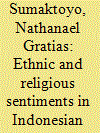

|
|
|
|
|
| Summary/Abstract |
Studies have documented how ethnic and religious sentiments shape the voting behavior of Indonesian Muslims. However, to date no studies have carefully measured the relative influence of these sentiments. I fill this gap in the literature by taking advantage of the candidacy of a Christian, ethnic Chinese candidate in the 2017 Jakarta gubernatorial election in Basuki Tjahaja Purnama (Ahok). Employing an original survey of Jakartan Muslims, I show through experimental and correlational analyses that Muslim voters are more opposed to Ahok than non-Muslim voters are and that this opposition is driven more by Ahok's ethnicity, as opposed to his religion. I also show that Muslim voters’ feelings toward ethnic Chinese shape their support for Ahok more than their feelings toward Christians. I discuss how these findings inform our understanding of the limits and extent of religious influence on Muslim voting behavior.
|
|
|
|
|
|
|
|
|
|
|
|
|
|
|
|
| 4 |
ID:
179560
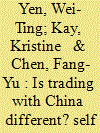

|
|
|
|
|
| Summary/Abstract |
Despite increasing economic integrations with China, worries exist in China's neighboring countries about China's implicit political intention. Do people view trading with China differently? In this article, we incorporate the political context of trade agreements by showing that trade with partners who come with political costs is less likely to be supported. Using a nationally representative survey experiment from Taiwan, we find that trading with China garners less support than trading with Japan or Malaysia, and nationalism suppresses self-interest when the proposed trading partner is China. We show that national attachment, which is neither a proxy for political identification nor a proxy for national chauvinism, becomes a stronger predictor of trade preferences toward China. While the political tension between China and Taiwan is unique, many countries see at least one other country posing a negative externality. Our finding suggests strongly identified nationalists would oppose engaging with a hostile outsider regardless of their self-interest.
|
|
|
|
|
|
|
|
|
|
|
|
|
|
|
|
| 5 |
ID:
179557
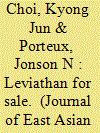

|
|
|
|
|
| Summary/Abstract |
We argue that the 2014 Sewol ferry disaster in South Korea, in which 304 passengers perished, was a result of the mode and process of privatization of South Korea's maritime police and rescue services. Through the development of a nuanced theory of privatization and use of a novel conceptualization of corruption, coupled with empirical analysis, our study shows that the outcome was symptomatic of a wider trend of systematic bureaucratic rent-seeking. A pro-active private sector ready to capitalize on the opportunity, in conjunction with a permissive political environment, resulted in a reduction of state capacity, with devastating consequences.
|
|
|
|
|
|
|
|
|
|
|
|
|
|
|
|
| 6 |
ID:
179561
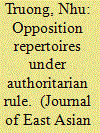

|
|
|
|
|
| Summary/Abstract |
Civil society actors collectively organized online and offline to nominate themselves and oppose the Vietnamese Communist Party in the 2016 legislative election. The level of opposition coordination among these independent self-nominees exceeded and qualitatively differed from previous atomized attempts in the 2011 election. External shifts in the political opportunity structure offer only a partial explanation for the increased coordination among independent candidates in Vietnam's 2016 self-nomination movement. In this article, I theorize that it is the combination of both opportunity structure and overlapping linkages across spheres of social contention and civil society, all accumulated from a prior history of protests and activism, that provide the conditions for the emergence of independent self-nominees and opposition coordination in single-party-elections. In Vietnam, a cumulative process of participation in social contention and civil society organizations during 2011 to 2016 allowed actors to develop linkages that strengthened their repertoires of contention and resonant frames of collective action. These linkages, combined with favorable political opportunities, effectively facilitated greater mobilization and coordination among independent self-nominees in the 2016 election.
|
|
|
|
|
|
|
|
|
|
|
|
|
|
|
|
| 7 |
ID:
179556
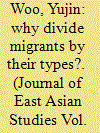

|
|
|
|
|
| Summary/Abstract |
This article compares the public perceptions of various types of migrants in Japan and examines whether Japanese view them equally. Using an original survey, which presented six types of migrants that Japanese people most commonly face in their daily lives, I show several interesting results. First, respondents express the most negative views toward labor migrants. Second, respondents who have migrant friends tend to have more positive feelings for all types of migrants. In contrast, simple coexistence with migrants fails to enhance public sentiment toward labor migrants, particularly those whose stay is temporary. Overall, my statistical results suggest that Japanese people are not pessimistic about every kind of migrant, and their openness increases as migrants acculturate into Japanese society and interact with Japanese people. These findings provide evidence to influence policy discussions on whether Japan should recruit labor migrants in its current form in order to fight its aging population.
|
|
|
|
|
|
|
|
|
|
|
|
|
|
|
|
|
|
|
|
|